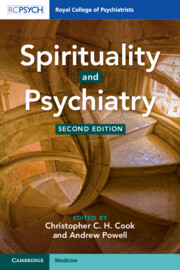Book contents
- Spirituality and Psychiatry
- Spirituality and Psychiatry
- Copyright page
- Contents
- Figures
- Tables
- Boxes
- Contributors
- Foreword to the Second Edition
- Foreword to the First Edition
- Preface to the Second Edition
- Preface to the First Edition
- Acknowledgements
- The Spirituality and Psychiatry Special Interest Group of the Royal College of Psychiatrists: A Personal Reflection
- Chapter 1 Spirituality and Religion in Psychiatry
- Chapter 2 Spiritual Assessment
- Chapter 3 Psychosis
- Chapter 4 Suicide
- Chapter 5 Child and Adolescent Psychiatry
- Chapter 6 Psychotherapy
- Chapter 7 Intellectual Disability
- Chapter 8 Substance Misuse and Addiction
- Chapter 9 Common Mental Disorders
- Chapter 10 Forensic Psychiatry
- Chapter 11 Meditation, Prayer and Healing
- Chapter 12 Religion and Spirituality in the DSM and ICD
- Chapter 13 Spiritual Care in the NHS
- Chapter 14 Spiritual and Religious Interventions
- Chapter 15 The Patient Perspective
- Chapter 16 Religion and Religious Experience
- Chapter 17 Pathological Spirituality
- Chapter 18 Ageing
- Glossary
- Index
- Plate Section (PDF Only)
- References
Chapter 7 - Intellectual Disability
Published online by Cambridge University Press: 07 October 2022
- Spirituality and Psychiatry
- Spirituality and Psychiatry
- Copyright page
- Contents
- Figures
- Tables
- Boxes
- Contributors
- Foreword to the Second Edition
- Foreword to the First Edition
- Preface to the Second Edition
- Preface to the First Edition
- Acknowledgements
- The Spirituality and Psychiatry Special Interest Group of the Royal College of Psychiatrists: A Personal Reflection
- Chapter 1 Spirituality and Religion in Psychiatry
- Chapter 2 Spiritual Assessment
- Chapter 3 Psychosis
- Chapter 4 Suicide
- Chapter 5 Child and Adolescent Psychiatry
- Chapter 6 Psychotherapy
- Chapter 7 Intellectual Disability
- Chapter 8 Substance Misuse and Addiction
- Chapter 9 Common Mental Disorders
- Chapter 10 Forensic Psychiatry
- Chapter 11 Meditation, Prayer and Healing
- Chapter 12 Religion and Spirituality in the DSM and ICD
- Chapter 13 Spiritual Care in the NHS
- Chapter 14 Spiritual and Religious Interventions
- Chapter 15 The Patient Perspective
- Chapter 16 Religion and Religious Experience
- Chapter 17 Pathological Spirituality
- Chapter 18 Ageing
- Glossary
- Index
- Plate Section (PDF Only)
- References
Summary
Spirituality is a deeply personal universal human experience, and people with intellectual disability may miss out on the expression of this vital part of their identity, which is a fundamental human right. An understanding of people with intellectual disability as creative communicators has been gained through action research, but spirituality is still a poorly understood aspect of their lives, giving rise to unmet needs. Outdated practices and beliefs about the origins of disability have led to a culture of exclusion or, at best, tokenism. Around the world, reports are still emerging of marginalization, discrimination and even abuse because of negative spiritual attribution or views about cognitive abilities and consequent economic worth. Faith communities and secular care providers need to incorporate new learning about the importance of spirituality for mental health into mainstream planning of care with the involvement of people with intellectual disabilities who communicate creatively as co-producers.
Keywords
- Type
- Chapter
- Information
- Spirituality and Psychiatry , pp. 139 - 157Publisher: Cambridge University PressPrint publication year: 2022



